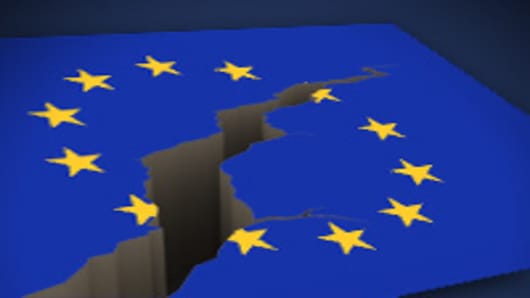When European Union (EU) leaders provided a bailout for Greece last May, they no doubt “did the right thing.” But in the process, their temporary response not only broke at least the spirit of the EU Treaty, but also set themselves up for the future challenge of reining in moral hazard on a permanent basis in what some now deride as Europe’s “Bail-out Union.”
The tough conditions attached to the IMF’s rescue were clearly bitter medicine for Athens and they will likely be even more painful for the much richer Ireland shortly, but they are nonetheless not sufficient to prevent future political opportunism from undermining them.
Future versions of Andreas Papandreou, the Greek socialist leader who dominated the country’s politics in the 1980s and 1990s, may emerge not only in Greece but in other parts of Europe, run their countries into the ditch and then resign and move to Monaco, leaving it to the EU and IMF and future generations to pick up the pieces.
The EU, therefore, needs before-the-fact prevention on moral hazard in addition to after-the-fact treatment.
This issue is particularly critical as political resistance to bailouts will rise exponentially with each new request for aid. Slovakia resisted participation in the Greek bailout, after (correctly) labeling it a case of “reverse Robin Hood,” in which countries poorer than Greece were being asked to bail it out.
If countries richer than Greece (Ireland has 120 percent of the euro zone average GDP per capita in 2010) request another bailout, the politics might make it impossible.
There is also the issue looming in Germany as the Constitutional Court reviews the German governments’ approval of the European Financial Stability Facility (EFSF). That pending judgment, too, is likely to be affected by whether the facility has set up tough disciplinary measures for countries seeking future bailouts.
Without euro-zone before-the-fact “disciplinary measures” in place at the time of its ruling, the Court might decide to take it upon itself to spell these out and lay down the conditions under which Germany can participate in euro zone bailouts. This is the nightmare scenario for Angela Merkel.
Jean Monnet, the father of the postwar European economic union, is alleged to have said that ”Europe will be forged in crises, and will be the sum of the solutions adopted for those crises.”
That remains true today. Europe only progresses through measures taken at times where crisis necessitates the abandonment of traditional political resistance to novel measures to prevent future crises.
Only now, when the effects of the previous crisis are still fresh on the minds of policymakers, can Europe hope to adapt credible solutions to prevent the next European financial crisis from spinning out of control.
Certainly, the ECB is in a difficult situation right now. As the keeper of financial market stability, it does not want to, through its decision to provide liquidity to Irish banks or not, become the de facto decision maker in whether Ireland goes broke or not. That decision should be left for elected Irish politicians. Nonetheless, EU politicians should look to the long-term interests of the entire euro zone project.
The idea that bureaucrats in Brussels could recommend automatic sanctions against elected EU governments has proved to be a non-starter. How then to enforce moral hazard preventing future bailouts?
The main option left is “market-based surveillance” – in effect a promise to enforce haircuts on private creditors in any future bailout. By making bondholders share the cost of a fiscal collapse, the euro zone avoids the situation from the late 1990s to September 2008, in which its sovereigns faced the same cost of capital and the same risk perception on their bonds, despite their diverse and indeed diverging economic fundamentals.
As the precedent for sovereign bailouts in the EU has been set, financial markets must be made to realize that they cannot rationally bet (as has so far been the case with Greece) that they will be fully protected by other EU countries’ taxpayers in future crises.
This is a timely and welcome proposal, and German leaders deserve credit for it. A permanent European crisis resolution mechanism (ECRM) imposing substantial losses on private sector creditors in the future is a potentially effective check on moral hazard for several reasons.
First, the time for policy makers to act is now. With many private bank assets already transferred to government “bad banks” (especially in Germany) and euro zone monetary stimulus already at record levels (benefitting banks greatly), the powerful financial lobby is not in a position to lobby as effectively against haircuts through an ECRM.
Second, a resolution mechanism will address a common difficulty in sovereign debt restructurings by shifting the costs of the bailouts on to “shareholders,” in this case residents and taxpayers of the country being bailed out.
Third, recall the concern that sank the IMF’s 2002 post-Argentina proposal for a global sovereign default restructuring mechanism (SDRM). It was that countries were unwilling to cede sovereignty to a supra-national entity. But these concerns are of less importance in Europe, where sovereignty is already “pooled” by the EU Treaty and constrained to an extent far beyond any other international forum.
Lacking information financial markets have in recent weeks prepared for the worst and driven up interest rates mostly of course for Ireland, but also for non-peripheral countries like Spain ahead of the actual EU Council decision.
However, the argument that the timing of “ECRM proposal” is solely responsible for the recent spike in yields in Ireland and Portugal in particular is not credible, and essentially amounts to another “peripheral excuse.”
Once decision is made and ECRM guidelines for a case-by-case approach to the size of haircuts is spelled out and “Argentinean options” are off the table, financial markets are likely to regain a measure of calm again, especially now that another “Greek style” bailout for Ireland looks imminent.
An ECRM would, some temporary volatility in Ireland notwithstanding, ensure that Europe today, as envisioned by Jean Monnet at the beginning, has forged a constructive long-term response to its current crisis.
_________________________
Jacob Funk Kirkegaard has been a research fellow at the Institute since 2002. Before joining the Institute, he worked with the Danish Ministry of Defense, the United Nations in Iraq, and in the private financial sector.



